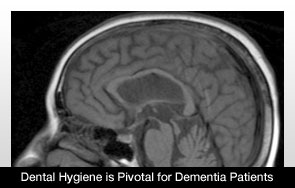 |
Nurses who treat dementia patients now have an added task. It’s essential for the nurses to make sure their patients maintain good dental hygiene.
Since poor oral health can lead to other health problems, it’s necessary for the dementia patients to have dental work done. But since they aren’t capable of remembering it or doing it themselves, they need their caretakers to handle the matter.
The new approach is called Managing Oral Hygiene Using Threat Reduction (MOUTh) and the program is tailored toward dementia patients. The form of care revolves around making the patient feel at ease when the care is being provided, as well as interacting with the patient.
The current issue of Special Care in Dentistry includes this information.
There are times when the dementia patients fight against the dental care they need because their fight, flight or freeze responses have deteriorated. So when a nurse reaches into a dementia patient’s mouth, for example, the person may feel threatened and react in a defensive manner.
Because the number of residents in nursing homes who still have their own has risen in the past three decades, it’s essential for these people to receive the dental work they need.
The information for the program was generated from seven people who had some form of dementia. The MOUTh technique was used on the participants for two weeks. Before the two-week period began, the subjects had a 7.29 oral health score but improved to a 1 when the time frame ended.
The study was led by Rita Jablonski, assistant professor of nursing at Penn State University.

|










